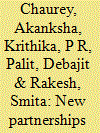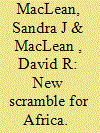| Srl | Item |
| 1 |
ID:
113494


|
|
|
|
|
| Publication |
2012.
|
| Summary/Abstract |
Twenty years since the Rio Summit, the global community is still struggling to develop a world with universal access to sustainable energy services. The discussion on energy and its linkages with sustainable development is at the heart of the debate in achieving the Millennium Development Goals (MDGs). This paper discusses the role of innovations in terms of partnerships and business models to enhance energy access, especially for those living at the so-called bottom of pyramid. The role of innovative energy options and policy choices that enable overall operationalization of energy access in developing countries as well as new forms of partnerships and innovative mechanisms that are based on established success, replicability and potential for scaling up has been examined through two case-studies, namely the Lighting a Billion Lives project and India's National Rural Electrification Programme. This paper suggests the need for new forms of public and private sector partnerships, especially the pro-poor ones that are effective in enhancing energy access.
|
|
|
|
|
|
|
|
|
|
|
|
|
|
|
|
| 2 |
ID:
089140


|
|
|
|
|
| Publication |
2009.
|
| Summary/Abstract |
At population levels, health outcomes are determined more by social conditions than by either biology or technological interventions. Therefore, entrenched and increasing inequalities associated with global transformations in political economy are among the most significant causal factors for so-called 'global health' problems that disproportionately afflict sub-Saharan Africans. Growing attention is being paid to the social causes of ill health, as evidenced in the WHO's recently introduced Commission on the Social Determinants of Health. However, the predominant paradigm continues to support a biotechnical/clinical health model that privileges pharmaceutical treatment of individual diseases over support for broader social change that would include improved broadly based national health systems as well as revised international economic structures. This paper examines the struggle involved in setting the normative framework for health in sub-Saharan Africa and the roles of major external actors in setting the policy agenda
|
|
|
|
|
|
|
|
|
|
|
|
|
|
|
|
| 3 |
ID:
128465


|
|
|
|
|
| Publication |
2014.
|
| Summary/Abstract |
Over the past decade a new form of philanthropy has emerged, termed 'philanthrocapitalism'. Champions of philanthrocapitalism suggest that private giving can fill the void left by diminished government spending on social and development programmes. Critics suggest that philanthropy is no substitute for strong governmental support for social welfare. Both arguments perpetuate a dichotomy between the public and the private, implying that philanthrocapitalism operates in a vacuum largely divorced from governmental interventions. In this article I challenge that assumption, exploring how new philanthropic initiatives have compelled increased financial support from governments toward the private sector. Drawing on three cases - advanced market commitments (amcs) in drug development; impact investing; and direct philanthropic and governmental grants to corporate entities - I illustrate the ways that governments remain one of the most powerful - if not the most powerful - philanthropic actors in the philanthrocapitalist turn.
|
|
|
|
|
|
|
|
|
|
|
|
|
|
|
|
| 4 |
ID:
153573


|
|
|
|
|
| Summary/Abstract |
THE REFORM OF STATE-OWNED ENTERPRISES (SOES) HAS BEEN A
leading element of public sector reform since the 1980s. Starting
with the radical actions of Margaret Thatcher’s government in
the United Kingdom, privatization was disseminated across the
world. By 2004, over $1 trillion of SOEs had been privatized.
The privatization stampede represented the ascendancy of neoclassical
economics and the view that governments should get
out of business and leave the invisible hand of the market to
either generate efficiency in often poorly performing enterprises
or simply close them down (World Bank 1995, 1996, 1997).
This neoliberal policy orientation dovetailed with the Washington
Consensus and the spread of New Public Management, both
of which sought leaner, more fiscally disciplined government
that focused on core functions (Turner, Hulme, and McCourt
2015).
|
|
|
|
|
|
|
|
|
|
|
|
|
|
|
|